![]() is the unit vector that points in the same direction as <-2,5>.
is the unit vector that points in the same direction as <-2,5>.


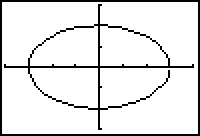
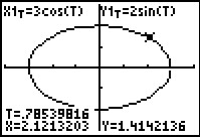
![]() The particle is at position (2.121, 1.414) at t =
The particle is at position (2.121, 1.414) at t =
![]() /4 seconds.
/4 seconds.
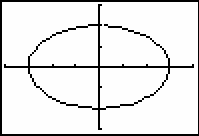
The velocity graph has the same shape as the position graph. However, the position graph started on the x-axis at time t = 0, while the velocity graph started on the y-axis.
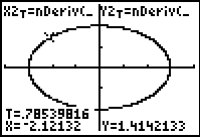
![]()
The particle is moving left at 2.121 units/sec and upward at 1.414 units/sec.
The acceleration graph has the same shape as the position and velocity graphs. However, the starting point of the acceleration graph is on the negative x-axis.
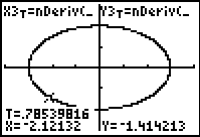
![]()
The particle is accelerating toward the left at 2.121 units/sec2 and downward at 1.414 units/sec2.
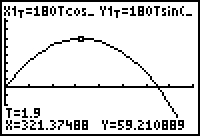
The projectile reaches its maximum height after about 1.9 seconds. The position vector at this time is approximately <321.4, 59.2>. In other words, the projectile reaches a maximum height of about 59.2 feet at a horizontal distance from the starting point of about 321.4 feet.
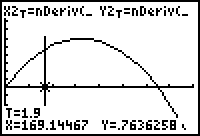
The velocity vector at t = 1.9 is approximately <169.1, 0.764>. This means the horizontal speed is about 169.1 ft/sec and the vertical speed is about 0.764 ft/sec.
The acceleration vector is always <0, -32>. This means that the horizontal acceleration is zero and the vertical acceleration is always 32 ft/sec2 downward.
![]()
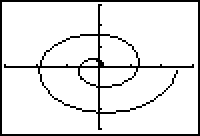
[0, 4
![]() , 0.1] x [-15,15, 5] x [-15,15, 5]
, 0.1] x [-15,15, 5] x [-15,15, 5]
The highest point is reached at about t = 3.8 seconds.
r(3.8)
![]() <653.7, 226.7>. At its highest point the particle has moved 653.7 ft horizontally and 226.7 ft vertically from its initial position.
<653.7, 226.7>. At its highest point the particle has moved 653.7 ft horizontally and 226.7 ft vertically from its initial position.
<172, -1.1>. The particle is moving right horizontally at 172.0 ft/sec and vertically downward at 1.1 ft/sec. The actual answer should be zero.
<0, -32>. The acceleration is 32 ft/sec2 downward. There is no horizontal acceleration.
©Copyright 2007 All rights reserved. | Trademarks | Privacy Policy | Link Policy